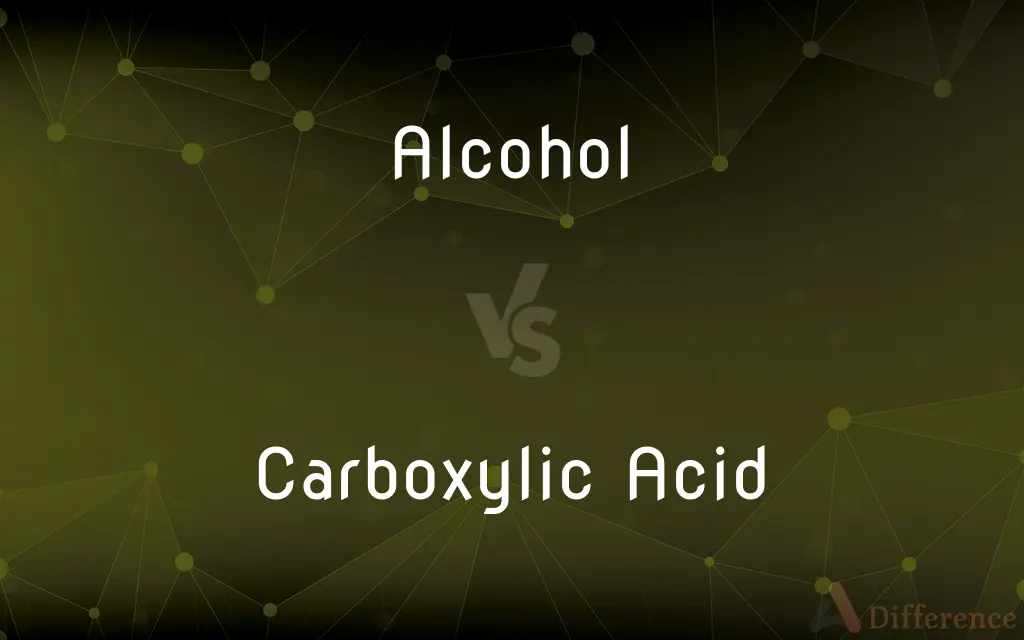Alcohol vs. Carboxylic Acid — What's the Difference?
Edited by Tayyaba Rehman — By Fiza Rafique — Published on December 16, 2023
Alcohol is an organic compound with a hydroxyl (OH) group attached to a carbon atom. Carboxylic Acid has a carboxyl (COOH) group. Both are important in organic chemistry.

Difference Between Alcohol and Carboxylic Acid
Table of Contents
ADVERTISEMENT
Key Differences
Alcohol is an organic compound characterized by the presence of a hydroxyl (OH) functional group. Carboxylic Acid, on the other hand, possesses a carboxyl (COOH) functional group, which is an extension of the hydroxyl group with an additional carbonyl (C=O) component.
In terms of reactivity, Alcohols are generally less reactive compared to Carboxylic Acids. The presence of the carbonyl group in Carboxylic Acids makes them more polar and acidic.
In the realm of organic synthesis, Alcohols are versatile intermediates and can be converted to many other functional groups. Carboxylic Acids also serve as important intermediates, particularly in the formation of esters, amides, and other acid derivatives.
When considering uses, Alcohols are found in various applications, from beverages to antiseptics to fuels. Carboxylic Acids are used in the manufacture of pharmaceuticals, plastics, food additives, and more.
From a biological standpoint, both Alcohols and Carboxylic Acids are crucial. Alcohols play roles in metabolism and cellular processes, while Carboxylic Acids are components of larger biomolecules like fats and amino acids.
ADVERTISEMENT
Comparison Chart
Functional Group
Hydroxyl (OH)
Carboxyl (COOH)
Acidity
Less acidic
More acidic due to the presence of carbonyl
Examples
Methanol, Ethanol
Acetic acid, Formic acid
Reactivity
Generally less reactive
More reactive due to polar nature
Occurrence in Nature
Fermentation processes, plant extracts
Fatty acids, amino acids
Compare with Definitions
Alcohol
An organic compound containing a hydroxyl functional group.
Ethanol is a common Alcohol used in beverages.
Carboxylic Acid
Organic acids containing a carboxyl functional group.
Acetic acid is a Carboxylic Acid found in vinegar.
Alcohol
A molecule with an OH group bonded to a carbon atom.
Isopropyl Alcohol is often used as a disinfectant.
Carboxylic Acid
Acids derived from hydrocarbons by replacing a hydrogen with carboxyl.
Benzoic acid is a Carboxylic Acid used as a food preservative.
Alcohol
A hydrocarbon derivative where hydrogen is replaced by hydroxyl.
Methanol is a simple Alcohol used as an industrial solvent.
Carboxylic Acid
Acids that can form salts and esters.
Salicylic acid, a Carboxylic Acid, is used in skincare products.
Alcohol
A class of substances used in drinks, medicine, and solvents.
The sale of Alcohol is regulated in many countries.
Carboxylic Acid
The class of organic compounds responsible for sour tastes in foods.
Citric acid, a Carboxylic Acid, gives lemons their characteristic sourness.
Alcohol
Any of a series of hydroxyl compounds, the simplest of which are derived from saturated hydrocarbons, have the general formula CnH2n+1OH, and include ethanol and methanol.
Carboxylic Acid
A molecule with a COOH group attached.
Fatty acids are long-chain Carboxylic Acids.
Alcohol
A colorless volatile flammable liquid, C2H5OH, synthesized or obtained by fermentation of sugars and starches and widely used, either pure or denatured, as a solvent and in drugs, cleaning solutions, explosives, and intoxicating beverages. Also called ethanol, ethyl alcohol, grain alcohol.
Alcohol
Intoxicating beverages containing ethanol considered as a group
The national consumption of alcohol.
Alcohol
Any of a class of organic compounds (such as ethanol) containing a hydroxyl functional group (-OH).
Alcohol
(colloquial) Ethanol.
Alcohol
(uncountable) Beverages containing ethanol, collectively.
Alcohol
(obsolete) Any very fine powder.
Alcohol
An impalpable powder.
Alcohol
The fluid essence or pure spirit obtained by distillation.
Alcohol
Pure spirit of wine; pure or highly rectified spirit (called also ethyl alcohol or ethanol, CH3.CH2.OH); the spirituous or intoxicating element of fermented or distilled liquors, or more loosely a liquid containing it in considerable quantity. It is extracted by simple distillation from various vegetable juices and infusions of a saccharine nature, which have undergone vinous fermentation.
Alcohol
A class of compounds analogous to vinic alcohol in constitution. Chemically speaking, they are hydroxides of certain organic radicals; as, the radical ethyl forms common or ethyl alcohol (C2H5.OH); methyl forms methyl alcohol (CH3.OH) or wood spirit; amyl forms amyl alcohol (C5H11.OH) or fusel oil, etc.
Alcohol
A liquor or brew containing alcohol as the active agent;
Alcohol (or drink) ruined him
Alcohol
Any of a series of volatile hydroxyl compounds that are made from hydrocarbons by distillation
Alcohol
A compound prevalent in fermentation processes.
Wine is produced through the fermentation of sugars into Alcohol.
Common Curiosities
How is a Carboxylic Acid group different from Alcohol?
Carboxylic Acid contains a carboxyl (COOH) group, while Alcohol has a hydroxyl (OH) group.
Which is more acidic, Alcohol or Carboxylic Acid?
Carboxylic Acid is more acidic than Alcohol.
What's the Alcohol present in alcoholic beverages?
The Alcohol present in alcoholic beverages is ethanol.
Can Alcohols be converted to Carboxylic Acids?
Yes, Alcohols can be oxidized to produce Carboxylic Acids.
Why do some Alcohols feel cold when applied to the skin?
The evaporation of Alcohol from the skin is an endothermic process, causing a cooling sensation.
How are Carboxylic Acids named in chemistry?
Carboxylic Acids are named based on the longest carbon chain bearing the COOH group with the suffix "-oic acid".
What functional group defines an Alcohol?
An Alcohol is defined by the presence of a hydroxyl (OH) functional group.
Can Carboxylic Acids be reduced to Alcohols?
Yes, Carboxylic Acids can be reduced to yield Alcohols.
Which is more reactive, Alcohol or Carboxylic Acid?
Generally, Carboxylic Acids are more reactive than Alcohols due to their acidic nature.
Are all Carboxylic Acids soluble in water?
Small Carboxylic Acids are water-soluble, but solubility decreases with increasing chain length.
Is the consumption of all Alcohols safe?
No, only ethanol is safe for consumption in moderation. Other Alcohols, like methanol, are toxic.
Are Alcohols polar molecules?
Yes, Alcohols are polar due to the presence of the hydroxyl group.
Are Alcohols and Carboxylic Acids important in biology?
Yes, both Alcohols and Carboxylic Acids play crucial roles in various biological processes and structures.
Can Carboxylic Acids donate protons?
Yes, Carboxylic Acids are acidic and can donate a proton.
What is the smell associated with Carboxylic Acids?
Many Carboxylic Acids have a pungent or sour smell, like vinegar which contains acetic acid.
Share Your Discovery

Previous Comparison
8085 vs. 8086
Next Comparison
Simple Microscope vs. Compound MicroscopeAuthor Spotlight
Written by
Fiza RafiqueFiza Rafique is a skilled content writer at AskDifference.com, where she meticulously refines and enhances written pieces. Drawing from her vast editorial expertise, Fiza ensures clarity, accuracy, and precision in every article. Passionate about language, she continually seeks to elevate the quality of content for readers worldwide.
Edited by
Tayyaba RehmanTayyaba Rehman is a distinguished writer, currently serving as a primary contributor to askdifference.com. As a researcher in semantics and etymology, Tayyaba's passion for the complexity of languages and their distinctions has found a perfect home on the platform. Tayyaba delves into the intricacies of language, distinguishing between commonly confused words and phrases, thereby providing clarity for readers worldwide.














































